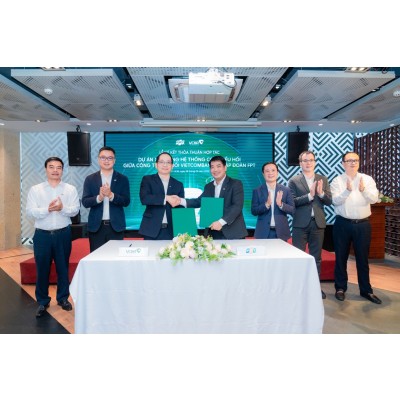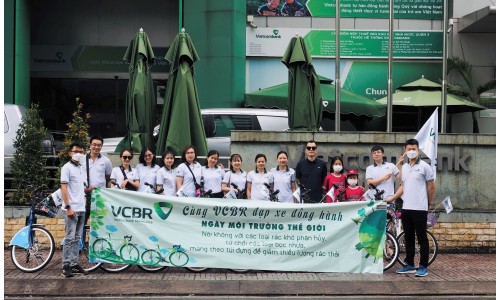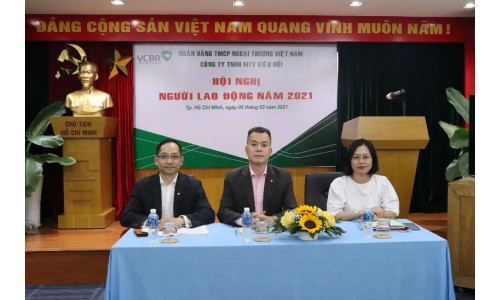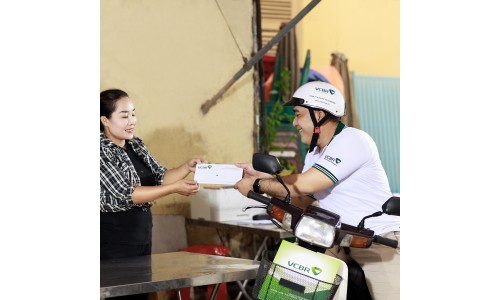In the context of the global economy facing its biggest challenge since World War II, the Russia-Ukraine war is negatively affecting the lives of millions of people, dragging down economic growth and increasing the inflation rate. In addition, the fact that China - the country that is considered as the world's factory, still persists in their Zero Covid policy and this has continued to break the global supply chain. The mentality of the majority of the Vietnamese community living abroad is being strongly affected. The worry about decreasing income, saving fund and increasing living expenses is creating great pressures and causing the significant reduction in the amount of remittance transferred to Vietnam.

Leaders of Vietcombank Remittance Company taking photos with dear guests

Employees and home delivery staffs of VCBR
Overview of global economic issues affecting global remittance flows.
The conference consisted of thematic presentations on global inflation, flows of investment, currency and exchange rates, labor export from Vietnam and the situation of the overseas Vietnamese community.

Mr. Trinh Hoai Nam - CEO of VCBR gave the opening speech at the conference
The Federal Reserve of the United States (FED) has raised interest rates in recent years, which adjusted global investment flows from developing countries into the US. Since then, the demand for the US dollar has increased, strengthened up the US dollar and pushing down the prices of other currencies. This is reflected in the US Dollar Index (DXY), which measures the volatility of the US Dollar compared with 6 major currencies (EUR, JPY, GBP, CAD, SEK, CHF) standing above 102 points. The devaluation of several currencies such as Won, Yen makes the Vietnamese community in Korea and Japan limit remittances to Vietnam with the mentality of waiting for the price of the local currency to rise again.
Japan is the labor export market, so the exchange rate is one of the important characteristics of this market. However, the Japanese currency began to lose value in 2021 as it was clear that the FED would raise the interest rates, creating a widening yield differential across the Pacific region. Moreover, the country's consumer price index (CPI) in April increased by 2.1%, exceeding the 2% target set by the Central Bank of Japan (BoJ) and the highest increase in the last 7 years. “We have repeatedly received feedback from customers about the above situation. The exchange rate between the Japanese Yen and currencies in the receiving markets was also severely affected. Therefore, the amount of money that their relatives received at their home country has also decreased significantly” - Kosuke Yamazaki – Representative of Kyodai Money Transfer from Japan shared.
The Korean government and the OECD lowered the economic growth rate from 3.1% - 3% to 2.6 - 2.7% due to inflationary pressures and the protracted war between Ukraine and Russia. The Korean Won has fallen about 10% against the dollar this year and traded at $1,323/KRW for the first time since 2009. According to Mr. Jeon Hyuk Goo - Director of E9Pay from Korea, this leads to illegal foreign currency transactions, in addition to the expectation of people for the exchange rate to rise, which has led to a clear decrease in the amount of remittance in this market to Vietnam in recent times.
Escalating prices directly affect people's habit, causing Vietnamese living abroad to cut down their spending and send less money home in order to maintain their lives. Countries around the world from the US, UK to Asia such as Korea and Japan are all going through difficult economic times as households are facing increasing pressures from inflation and the risk of scarcity. food scarcity. As the reports have stated, the average transaction value in the first 6 months of 2022 decreased by about 40% and the number of transactions also decreased by 10%, compared to the first half of 2021.
In the first 6 months of 2022, the total number of Vietnamese workers working abroad under contracts was 51,677 people, notably, the Japanese market received 32,053 workers, and Taiwan: 15,633 workers, Korea: 1,209 workers. In this year, besides the traditional markets including Japan, Taiwan (China), Korea...., our government will continue to promote the signing of agreements on labor cooperation with other countries such as Germany, Russia, Australia, Israel and some other European markets. The rebound from labor export activities can be a positive signal to the amount of remittances to Vietnam in the near future.
However, Mr. Jorge De Feria - Operations Director of Sigue Sigue Corporation - one of the top 4 global money transfer companies also shared some optimistic comments: “We should always remember that our senders have proven many times, no matter how many difficulties they face, they will still care and try to send money to support their families back home as we have seen in previous crisis in the past. Don't underestimate them." Before the inflation index in the US continued to escalate to 9.1%, the highest since 1981, the government in the US has flexible solutions to support people in California - a state with the largest Vietnamese community, with an inflation support package up to 1,050 USD a month per family. With swift support and interest rate hikes that have somewhat curbed the pace of inflation, Vietnamese living in the US continue to show why they have always been a steady and persistent flow of remittances to Vietnam.

Representatives of international money transfer companies taking photos with VCBR
Every year, the VCBR partner conference is held on an increasingly large scale. The conference is not only limited to discussing matters of strengthening cooperation between VCBR and each partner, but also an opportunity for money transfer partners from many regions around the world to share about the impact on the flow of global remittance as well as the flow of money transferred to Vietnam. At the conference, Mr. Trinh Hoai Nam - CEO of VCBR, appreciated the sharing on the practical situation from partners around the world. Typically, the pandemic has changed the behavior of customers from using cash, especially in the US and Taiwan markets, to digital payment methods because of key functions such as easy and fast online payment, user-friendly interface and convenient bill payment. In the face of these challenges, Mr. Nam said that Vietcombank Remittance Company as well as major money transfer companies in the world realize that many opportunities are also available to take advantage of this difficult time to invest resources for the sustainable growth in the future.

































